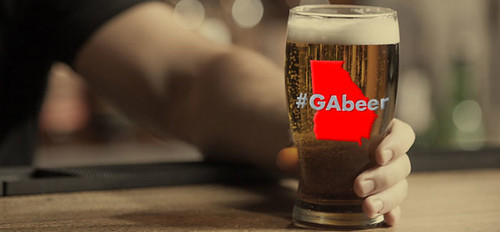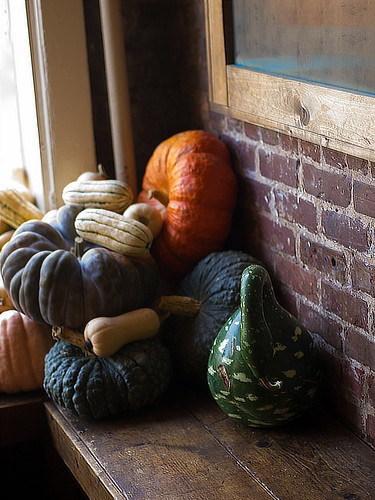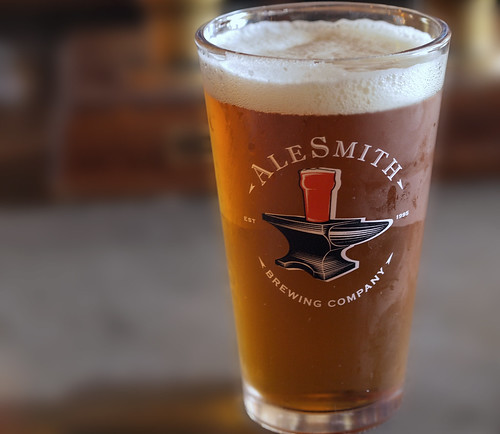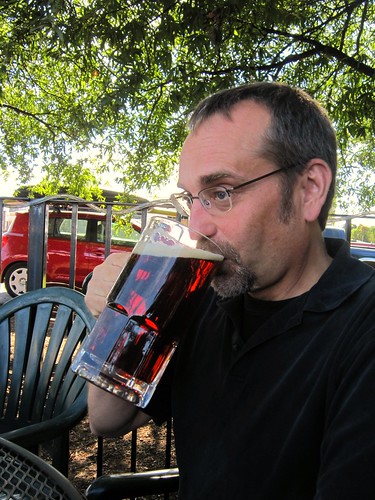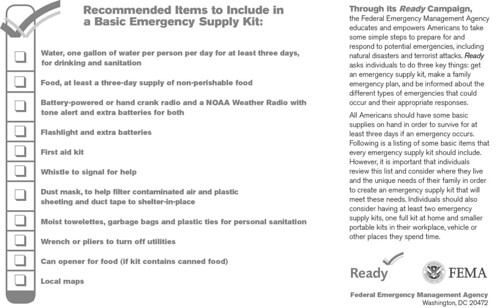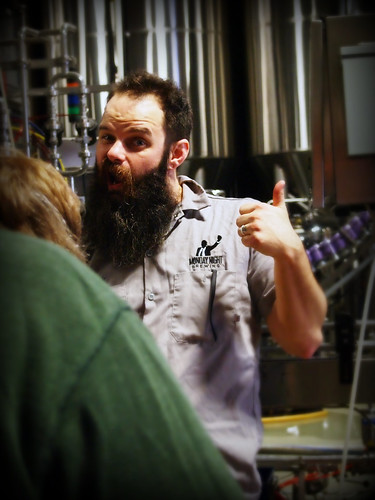Saturday, September 30, 2017
Pic(k) of the Week: Bug in the yard
As seen in Atlanta (Edgewood), Georgia, on 12 September 2017.
Why was that Volkswagen Bug there? I don't know. But...it did appear snug as a Bug in a rut.
-----more-----
Friday, September 29, 2017
What's the economic impact of 'craft' beer in your state?
Small and independent American craft brewers contributed $67.8 billion to the U.S. economy in 2016. The figure is derived from the total impact of beer brewed by craft brewers as it moves through the three-tier system (breweries, wholesalers, and retailers), as well as all non-beer products like food and merchandise that brewpub restaurants and brewery taprooms sell. [...] The industry also provided more than 456,000 full-time equivalent jobs, with more than 128,000 jobs directly at breweries and brewpubs, including serving staff at brewpubs.
On Tuesday, the [U.S.] Brewers Association (BA) released the 2017 edition of its Economic Impact Report, a biennial analysis featuring the economic contribution of 'craft' brewing of all fifty states and the District of Columbia. It assembled those data (from 2016) in five categories, by state:
- Total Economic Contribution
- 1. California $7.3 billion
- 2. Pennsylvania $5.8 billion
- 3. Texas $4.5 billion
- 4. New York $3.4 billion
- 5. Florida $3.1 billion
[...]- 51. Rhode Island $152.3 million
- 2. Pennsylvania $5.8 billion
- 1. California $7.3 billion
- Economic Contribution, per capita
- 1. Colorado $764.34
- 2. Vermont $666.78
- 3. Oregon $659.12
- 4. Pennsylvania $615.77
- 5. Montana $549.98
[...]- 51. Mississippi $148.33
- 2. Vermont $666.78
- 1. Colorado $764.34
- Craft Jobs
- 1. California 49,308
- 2. Pennsylvania 39,841
- 3. Texas 26,506
- 4. Florida 23,077
- 5. Colorado 22,220
[...]- 51. Wyoming 1,108
- 2. Pennsylvania 39,841
- 1. California 49,308
- Craft Labor Contribution
- 1. California $2.71 billion
- 2. Pennsylvania $1.87 billion
- 3. Texas $1.42 billion
- 4. New York $1.31 billion
- 5. $1.05 billion
[...]- 51. Rhode Island $55.3 million
- 2. Pennsylvania $1.87 billion
- 1. California $2.71 billion
- Average Craft Wage
- 1. Washington, D.C. $64,300
- 2. New York $59,952
- 3. Oklahoma $57,167
- 4. California $55,019
- 5. Connecticut $54,755
[...]- 51. Mississippi $38,176
- 2. New York $59,952
- 1. Washington, D.C. $64,300
The BA offers two lists at its website —the top five states for economic contribution and the top five for per capita economic contribution— and the same on an interactive map. The remainder of the state data is available in a pdf table, with the states listed alphabetically. I spent a few minutes to enter the data into a spreadsheet, sorting by rank in each of the five categories. Here: the state rankings, by total economic impact.
Go here to see a larger view of the table. Click each of the links above to see the state data sorted by the other four categories.
California dominates —as would be expected by its size— in total economic contribution, craft jobs, average wage, and the economic contribution of those jobs. It falls out of the top five in per capita impact (to 27th), where the top spot is held by Colorado. Pennsylvania is also a powerhouse appearing in the top five for four of the five categories: economic contribution, per capita contribution, jobs, and labor contribution. In terms of a state's average craft beer wage, the best in the nation is Washington, D.C., offering its beer workers an average wage of $64,300. The worst in the U.S. is Mississippi, at $38,176.
According to the BA, the data for this Economic Impact Report is based on two national surveys it conducts: the annual Beer Industry Production Survey (BIPS) and the bi-annual Brewery Operations Benchmarking Survey (BOBS), as well as additional government and market data. The BA then entered the data into an IMPLAM software input-output analysis "in order to examine the broader ripples of craft brewers in the national and state economies." Breweries that did not fit the BA's criteria for 'craft' brewery were not included. In addition, the association excluded non-beer beverage alcohol products of craft breweries such as cider and flavored malt beverages (FMB), while including certain other non-beer products such as food at brewpubs.
Unlike the BA, the Beer Institute looks at the U.S. beer industry as a whole. Its most recent data show that the U.S. beer industry provided jobs to nearly 2.23 million Americans, contributed over $350 billion to America’s economy, and paid $63.5 billion in annual taxes. Brewers and importers directly employed 64,745 Americans. Suppliers to the brewing industry employed more than 491,800 Americans. Beer wholesalers directly employed more than 134,240 Americans. Beer retailers employed 915,700 Americans.
Comparing statistics produced by different methodologies can be problematic, but, nonetheless, the BA's Economic Impact Report shows that 'craft' beer stands well compared with the entire beer industry: contributing an economic impact of $67.8 billion produced via 456,000 full-time equivalent jobs. I'd say those are significant contributions.
Bart Watson is the chief economist for the BA, ultimately responsible for preparing this report. I'll leave it to him, and others smarter than me, to 'drill down' and offer more thorough analysis.
-----more-----
Monday, September 25, 2017
Clamps & Gaskets: News Roundup for Weeks 35/36, 2017.

A bi-weekly, non-comprehensive roundup
of news of beer and other things.
Weeks 35/36
27 August - 9 September 2017
- 9 September 2017
Roger Protz, the long-time editor of CAMRA's Good Beer Guide, retires at 78.He edited the [Campaign for Real Ale] annual guide from 1978 to 1983 and from 2000 to 2018. And he has traveled the world writing about beer. But his proudest achievement is helping to save traditional British beers from extinction. [...] Roger says nothing beats a pint of cask ale, which he calls “the champagne of the beer world.”
—Via Daily Mirror. - 7 September 2017
It was a bad day for four hundred of Anheuser-Busch InBev's American employees who sell its "High End" products (formerly independent 'craft' breweries Goose Island, Blue Point, 10 Barrel, Elysian, Golden Road, Four Peaks, Breckenridge, Devils Backbone, Karbach, and Wicked Weed). The world's lagest international beverage conglomerate fired them.
—Via Brewbound. - 7 September 2017
If one ignores the sales slumps of the top two 'faux-craft' brands —Blue Moon (Molson Coors) and Shock Top (Anheuser-Busch InBev)— and of the top two 'craft' breweries (as defined by the [U.S.] Brewers Association) —Boston Beer/Samuel Adams and Sierra Nevada— the year-to-date dollar sales for 'craft' beer have actually jumped from a growth of 5.5% last year to 11.3% this year (rather than the reported 6%). That might be having fun with statistics, but, then again, those four brands do comprise roughly a quarter of all 'craft' dollars, "which tells us that nearly three-quarters of the craft segment is still collectively displaying double-digit growth."
—Via Bump Williams in Beer Business Daily, as quoted by YFGF (on Facebook). - 5 September 2017
Attorney General Jeff Sessions says Justice Department will begin deportation of DACA (Deferred Action for Childhood Arrivals) so-called "Dreamers" —nearly 800,000 undocumented immigrants brought to the U.S. as children— in six months. Anyone who has a DACA permit expiring between now and 5 March 2018 has until 5 October 2017 to apply for a two-year renewal.
—Via The Atlantic. - 4 September 2017
Cheers to hard-working brewers on Labor Day.“I often comment that there's a lot of money in beer, and there is ... for some owners. The folks who actually work in the breweries--not so much. Brewing is having its moment as a high-status job, but the work itself is blue-collar, lift-and-sweat labor. Even at small breweries, where new-recipe creation happens each week (the glamorous part), for the people who must put water to malt and make those beers, the days are long and hard.”
—Via Beervana.
—Jeff Alworth, Beervana
“Labor issues are the Achilles heel of the craft beer movement. We need to become an industry that provides our brewers with career-satisfying wages, or craft beer businesses won’t be sustainable.”
—Ben Edmunds, Breakside Brewing - 4 September 2017
On Labor Day, looking back on Curt Flood: How one man changed Major League baseball, affording players contract rights held by most other American workers, and, in the process, ruined his career.
—Via SB Nation. - 3 September 2017
[Louis] Pasteur was already a scientific icon when he decided to work on brewer's yeast [in the 1870s]. He had done revolutionary work on wine-making, dairy production, silkworms, and important theoretical work in chemistry and biology. His reason for taking up work on beer was rather surprising: he wanted national revenge over Germany. Germany attacked France in July 1870, causing his only son to enlist and interrupting construction of Pasteur's laboratory. [From that starting point, Pasteur identified yeast as the agent of fermentation and demonstrated how brewers] could use the tools and methods of microbiologists to get better control over and understanding of their own brewing.
—Via Larsblog. - 1 September 2017
Ugly Beauty. Son of jazz giant Thelonious Monk sues craft brewery North Coast (in Fort Bragg, California) for exploiting his father’s name.
—Via The Drinks Business. - 1 September 2017
How 'craft' breweries in Texas fared during Hurricane Harvey; how they and other 'craft' breweries asssisted victims of the Category 5 hurricane.
—Via [U.S.] Brewers Association. - 1 September 2017
Beginning September 1, 2017, Georgia breweries will be granted the ability to sell their product directly to their customers. This comes after a long and collaborative effort by Georgia’s breweries and distributors creating and recreating proposals for the state in the form of State Bills to be approved by the state’s House and Senate and eventually signed into law by the Governor.
—Via Porch Drinking. - 30 August 2017
The great beer writer Michael Jackson (1942-2007) —the Beer Hunter— died ten years ago today. British-born, world-beloved, Jackson was the prime promulgator, in several books, of the concept of beer 'type' or 'beer style,' based on geography and tradition, but also ingredient and process. A novel idea in 1977, 'beer style' is now well-established, if often twisted beyond Jackson's original premise. Earlier this year, British beer writers Jessica Boak and Ray Bailey looked at his legacy:The Beer Hunter was a persona. Michael Jackson, on the other hand, was a complex person, with all of his faults, foibles, and doubts in tow.
—Via Beer Advocate. - 30 August 2017
DRAFT Magazine, founded in 2007, has been acquired by All About Beer Magazine and will be discontinued, except for its web presence. The announcement, by DRAFT's CEO, is a gem of gobbledygook.
All About Beer, founded in 1980, was itself sold in 2014 by its longtime owner, GABF co-founder, Daniel Bradford.This merger is about a shared vision of how we plan to serve the craft beer industry in the future. In addition to our award-winning content, our integrated solutions platform is designed to create value throughout the craft ecosystem. Our total focus is to help brewers of any size tell their stories, build their brands, and serve their communities.
—Via Paste Magazine. - 28 September 2017
The Anheuser-Busch InBev brewing plant in Cartersville, Georgia sends more than 500,000 cans of water to Harvey victims in Texas.
—Via WSB-TV (Atlanta).
Saturday, September 23, 2017
Pic(k) of the Week: Pumpkins on a sill
Cook 'em and serve 'em with a beer. Just don't put 'em in a beer. Thank you.
A gorgeous cornucopia of gourds sits on a bench, in a pub, at the end of summer, on 20 September 2017, in the Little 5 Points neighborhood of Atlanta, Georgia.
-----more-----
Friday, September 22, 2017
Wistful, like summer departed.
Summer dies today. A monody for the occasion:
And now the purple dusk of twilight time—"Stardust" was composed in 1927 by Hoagy Carmichael; two years later, Mitchell Parish added lyrics. In 2004, Carmichael's original recording of the song was one of 50 recordings chosen by the Library of Congress to be added to the National Recording Registry.
Steals across the meadows of my heart.
High up in the sky, the little stars climb,
Always reminding me that we're apart.
You wander down the lane and far away,
Leaving me a song that will not die.
Love is now the stardust of yesterday,
The music of the years gone by.
Sometimes I wonder why I spend
The lonely night dreaming of a song.
The melody haunts my reverie,
And I am once again with you,
When our love was new,
And each kiss an inspiration.
But that was long ago.
Now my consolation
Is in the stardust of a song.
Beside a garden wall,
When stars are bright,
You are in my arms.
The nightingale tells his fairy tale,
A paradise where roses bloom.
Though I dream in vain,
In my heart, it will remain,
My stardust melody,
The memory of love's refrain.
The great Lester Young on tenor saxophone, in 1954 —with Oscar Peterson, piano; Barney Kessel, guitar; Ray Brown, bass; J. C. Heard, drums.
-----more-----
Thursday, September 21, 2017
Drinking, again! San Diego comes to Atlanta.
AleSmith (of San Diego, California) only recently began shipping its beers to Atlanta, Georgia. And, on 20 September 2017, the Porter Beer Bar (in Atlanta's Little 5 Points neighborhood) was pouring AleSmith's "IPA" on draught.
- About the beer, the brewery says:
Aromas of grapefruit and tangerine lead into an abundance of fresh pine and tropical fruit notes followed by a crisp, resinous bitterness. The complex hop profile is supported by a firm malt presence...
- Alcohol-by-volume (ABV): 7.25%
- Bitterness: 73 IBUs (International Bittering Units)
- YFGF says:
Compared to many latter-day IPAs, this one is positively restrained in its tropical fruit-candy hop essence. There's even some cracker malt evident. It all finishes with a bracing slug of piney, drying bitterness; there's no tug-of-war between sweet and dry. At that alcohol level, one pint is good 'n' plenty. Bonus points for the simple, non-fanciful name.
*******************
Drinking, again! is a series of occasional reviews of beer (and wine and spirits). No scores; only descriptions.
-----more-----
Saturday, September 16, 2017
Pic(k) of the Week: Oktoberfest stein
Today's Pick of the Week hits four bases: Oktoberfest, beer, 'throwback,' and 'selfie.'
That's me (ungrammatical but colloquial) enjoying a Maßkrug (High German for liter mug) of Legend's Oktoberfest lager (redundant but didactic) outdoors at Legend Brewing Company, at its brewery in Richmond, Virginia, seven years ago, on the 4th of September, 2010.
Americans use the synecdoche "stein" to refer to a mug of beer. Germans do not. In German, "stein" means "stone." For a mug, a German would say "Krug" or "Seidel." A "Maßkrug" is a liter mug. A liter comprises 33.81 U.S. ounces or more than two U.S. pints; a Maßkrug weighs about 5.5 U.S. pounds full. Despite my sober demeanor: giddy me!
The 'official' —and original Oktoberfest— begins today in Munich, the capital of the state of Bavaria in Germany. The celebration traditionally runs for sixteen days counting backward from the first Sunday in October. Since the 1990s, however, if the sixteenth day falls before 3 October (which is German Unity Day), the festival continues until and including the 3rd. Thus, Oktoberfest this year —the festival's 184th iteration— comprises a full eighteen days: 16 September through 3 October.
Munich's name, by the way, is derived from the Old German term Munichen, meaning "by the monks," after Benedictine monks who founded a monastery in what would later become the city. Trappist monks —a later, stricter, offshoot of the Benedictine order— would become known in the 20th-century Belgium for their iconic eponymous ales.
-----more-----
Labels: beer review, Cizauskas, drinking again, Oktoberfest, Pic(k) of the Week, Virginia
Monday, September 11, 2017
Clamps & Gaskets: News Roundup for Weeks 33/34, 2017.

A bi-weekly, non-comprehensive roundup
of news of beer and other things.
Weeks 33/34
13 August - 26 August 2017
- 25 September 2017
Molson Coors has been accused of selling Carling Lager at 3.7% alcohol-by-volume as 4% for 5 years, reportedly in order to avoid a £50 million tax bill. The company says that the variance was within the allowable range, which, it says, exists to accommodate occasional fluctuations in fermentation, and was not to enable a 5 year long campaign of tax avoidance.
—Via Daily Mail. - 25 August 2017
Donald Trump pardons former Arizona sheriff Joe Arpaio, the former Arizona sheriff whose aggressive efforts to hunt down and detain undocumented immigrants made him a national symbol of the divisive politics of immigration and who was convicted of contempt of court in July for defying a judge’s order to stop racially profiling Latinos.
—Via The Guardian. - 24 August 2017
Interior Secretary Ryan Zinke announces plan to reduce size of national monuments Bears Ears, Grand Staircase-Escalante, and Cascade-Siskiyou, and reviewing status of dozens of others protected by actions of several previous presidents.
—Via Washington Post. - 23 August 2017
Yakima, Washington-based hop broker 47 Hops LLC —which purchases hops from growers and resells them to brewers— has filed for Chapter 11 bankruptcy protection, reporting liabilities of $7.4 million, unsecured claims of $2.9 million, and assets of $4.3 million. 47 Hops president Douglas MacKinnon said thatBrewers, fueled by optimism, contracted for more hops than they now need,” while blaming declining demand for his hop supply on slowing craft sales. To make matters worse, several of 47 Hops’ brewery clients delayed payment and delivery of their hops during the last year, MacKinnon said. “Payments for some contracted hops are one year behind schedule. Some brewers have stopped responding to calls and emails altogether.”
—Via Brewbound. - 23 August 2017
Alaska's permafrost is no longer permanent, thawing as one result of climate change and one potential cause of future warming.
—Via New York Times. - 22 August 2017
John Abercrombie —influential jazz guitarist of 1970s fusion jazz (and more than that)— has died at 72.
—Via Chicago Tribune. - 21 August 2017
From Oregon on the west coast to South Carolina on the east, the "Great American Eclipse 2017" was the first total eclipse to traverse the entire continental United States since 1918. The wait for the next totally-American total eclipse won't be quite as long. It will darken the width of the continent twenty-eight years from now, on 12 August 2045.
—Via YFGF. - 20 August 2017
Jerry Lewis, the comedian, actor and filmmaker who was adored by many, disdained by others, but unquestionably a defining figure of American entertainment in the 20th century, died at his home in Las Vegas. He was 91.
—Via New York Times. - 19 August 2017
Known as a comedian who broke racial barriers, served as a civil rights activist and advocated for a healthier lifestyle, Dick Gregory has died.
—Via New York Times. - 17 August 2017
—Via Eater.Craft culture fetishizes the authentic, the traditionally produced, and the specific; it loathes the engineered, the mass-produced, and the originless. [...] Craft culture tells mostly white stories for mostly white consumers and they always sound the same. - 16 August 2017
In what may be a trend, 'craft' breweries, large and smaller, have been opening additional or satellite locations. For exampe, Green Flash —a San Diego, California-based brewery which only last year opened a second brewing location in Virginia Beach, Virginia— has announced plans to open a third brewery, this time with an attached restaurant, in Lincoln, Nebraska.
—Via Porch Drinking. - 16 August 2017
When a customer (nicely) asked a small 'craft' brewery about inconcistency in its beers, the brewery told him to f*** off. Opprobium for the brewery was widespread.
—Via Paste. - 15 August 2017
Jack Daniel's Distillery has revised its official company history to acknowledge Nearest (Nathan) Green, born an African-American slave, as its original master distiller. In the photo, Jack Daniel, on the right with a mustache and wearing a white hat, is shown at his distillery in Tennessee in the later 1800s. Nearest Green [or one of Green’s sons] is believed to be the man pictured on the left.
—Via New York Times. - 15 August 2017
Over the 52-week period ending in June 2017, on-the-premises beer sales decreased 2% over the same period the year before, whereas wine sales were up 1.5% and spirits up 1.6%. Off-the-premises beer sales did increase but by only 0.1%, whereas wine increased 1.4% and spirits, 2.2%.
—Via Brewbound (quoting Nielsen). - 13 August 2017
More than nine billion tons of plastic has been produced since 1950, and the vast majority of it is still around, with literally one ton of plastic garbage for every human on Earth.
—Via Washington Post.
Overheard: "Can I watch the solar #eclipse at night? I work during the day."
— YFGF (@Cizauskas) July 15, 2017
Saturday, September 09, 2017
Pic(k) of the Week: One Blue Pussy
A blue-shirt and blue-jeans clad museum-goer examines Andy Warhol's "One Blue Pussy" at an exhibition of the artist's work at the High Museum, in Atlanta, Georgia, on 1 September 2017.
In the 1950s, Andy Warhol worked as a freelance children's-book illustrator while sharing a Lexington Avenue apartment with his mother and 25 cats. He apparently never intended to host an entire cat colony in his apartment, but the head count continued to grow after he decided to find a companion for his first cat, Hester.
Warhol created colorful lithographs of the felines in his spare time. In 1954, the artist released the drawings, accompanied by his mother’s calligraphy, in the limited-edition book 25 Cats Name Sam and One Blue Pussy. Untrue to its grammatically flawed title, 25 Cats features prints of only 16 different cats. Except for the cat named Blue Pussy, each one is named Sam, after the first cat Warhol bought to keep Hester company. Original copies of the book are hard to come by — Christie’s once estimated one copy at $40,000 to $60,000.
-----more-----
Friday, September 08, 2017
Building an Emergency Kit
Because sometimes it's not just about the beer (even though a six-pack or two of canned beer might just come in handy) ...
FEMA (the Federal Emergency Management Agency of the Department of Homeland Security) recommends that all Americans should have some basic supplies on hand in order to survive for at least three days in case of an emergency. Stay safe.
Here is FEMA's checklist for Building an Emergency Kit:
Make sure your emergency kit is stocked with the items on the checklist below. Most of the items are inexpensive and easy to find, and any one of them could save your life. Headed to the store? Download a printable version to take with you. Once you take a look at the basic items, consider what unique needs your family might have, such as supplies for pets, or seniors.
After an emergency, you may need to survive on your own for several days. Being prepared means having your own food, water, and other supplies to last for at least 72 hours. A disaster supplies kit is a collection of basic items your household may need in the event of an emergency.
Make sure your emergency kit is stocked with the items on the checklist below. Most of the items are inexpensive and easy to find, and any one of them could save your life. Headed to the store? Download a printable version to take with you. Once you take a look at the basic items, consider what unique needs your family might have, such as supplies for pets, or seniors.
After an emergency, you may need to survive on your own for several days. Being prepared means having your own food, water, and other supplies to last for at least 72 hours. A disaster supplies kit is a collection of basic items your household may need in the event of an emergency.
- Basic Disaster Supplies Kit
To assemble your kit, store items in airtight plastic bags and put your entire disaster supplies kit in one or two easy-to-carry containers such as plastic bins or a duffel bag. A basic emergency supply kit could include the following recommended items:
- Water
One gallon of water per person per day for at least three days, for drinking and sanitation.- Food
At least a three-day supply of non-perishable food.- Battery-powered or hand crank radio and a NOAA Weather Radio with tone alert.
- Flashlight.
- First aid kit.
- Extra batteries.
- Whistle to signal for help.
- Dust mask to help filter contaminated air and plastic sheeting and duct tape to shelter-in-place.
- Moist towelettes, garbage bags, and plastic ties for personal sanitation.
- Wrench or pliers to turn off utilities.
- Manual can opener for food.
- Local maps.
- Cell phone with chargers and a backup battery.
- Download the Recommended Supplies List (PDF).
Additional Emergency Supplies
Consider adding the following items to your emergency supply kit based on your individual needs:
- Prescription medications.
- Non-prescription medications
Such as pain relievers, anti-diarrhea medication, antacids, or laxatives.- Glasses and contact lens solution.
- Infant formula, bottles, diapers, wipes, diaper rash cream.
- Pet food and extra water for your pet.
- Cash or traveler's checks.
- Important family documents
Such as copies of insurance policies, identification, and bank account records saved electronically or in a waterproof, portable container.- Sleeping bag or warm blanket for each person.
- Complete change of clothing appropriate for your climate and sturdy shoes.
- Household chlorine bleach and medicine dropper to disinfect water.
- Fire extinguisher.
- Matches in a waterproof container.
- Feminine supplies and personal hygiene items.
- Mess kits, paper cups, plates, paper towels, and plastic utensils.
- Paper and pencil.
- Books, games, puzzles or other activities for children.
Maintaining Your Kit
After assembling your kit remember to maintain it so it’s ready when needed:
- Keep canned food in a cool, dry place.
- Store boxed food in tightly closed plastic or metal containers.
- Replace expired items as needed.
- Re-think your needs every year and update your kit as your family’s needs change.
Kit Storage Locations
Since you do not know where you will be when an emergency occurs, prepare supplies for home, work and vehicles.
- Home
Keep this kit in a designated place and have it ready in case you have to leave your home quickly. Make sure all family members know where the kit is kept.- Work
Be prepared to shelter at work for at least 24 hours. Your work kit should include food, water and other necessities like medicines, as well as comfortable walking shoes, stored in a “grab and go” case.- Vehicle
In case you are stranded, keep a kit of emergency supplies in your car.
-----more-----
Monday, September 04, 2017
Happy Labor Day!
The U.S. beer industry provides jobs to nearly 2.23 million Americans, contributes over $350 billion to America’s economy, and pays $63.5 billion in annual taxes.
- Brewers and importers directly employ 64,745 Americans.
- Suppliers to the brewing industry employ more than 491,800 Americans.
- Beer wholesalers directly employ more than 134,240 Americans.
- Beer retailers employ 915,700 Americans.
****************
And 'craft' beer?
****************
Labor Day
Of the Super Bowl, Thanksgiving, 4th of July, Christmas, Memorial Day, and Labor Day ... more beer is sold in the United States for Labor Day libations (off-the-premises, more than sixty million cases) than for any other holiday.Yeast never sleeps. Your local brewster is probably hard at work today, doing her part. Support the American worker. Do your part. Drink a beer (or two). Honor Labor Day.
-----more-----
Saturday, September 02, 2017
Pic(k) of the Week: Roots
Ent-like, the twisted roots of a tree —limned in late afternoon sun and shadow— guard the steps at the entrance to Walker Park, in Atlanta (Edgewood), Georgia, on 28 August 2017.
A Chihuahua photo-bombed the photo. Had she espied something sinister within the roots?
-----more-----
Friday, September 01, 2017
Happy Georgia Brewery Liberation Day!
It's the first of September 2017, which means that, as of today, Georgia has joined with the rest of the Union. Breweries in the state of Georgia can now sell THEIR own beers in THEIR own taprooms to THEIR own customers.
Georgia has become the 51st (that is, the last) of all 50 states and Washington, D.C. to permit this. (The penultimate laggard, Mississippi, enabled its permission on 1 July.) Georgia Governor Nathan Deal signed bill SB-85 on 8 May; it took effect today.
Better late than never, no?
-----more-----


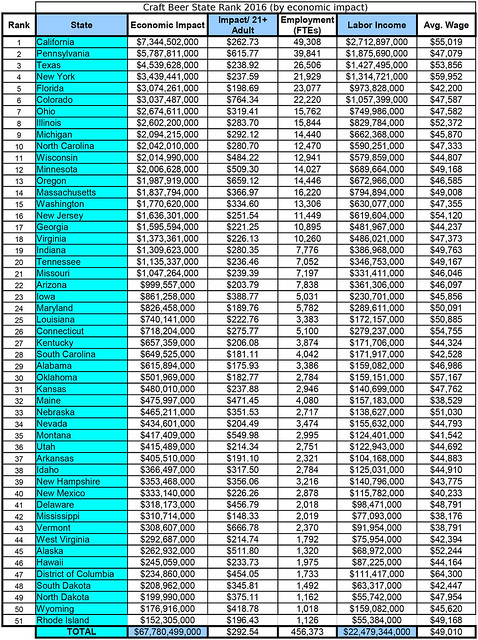

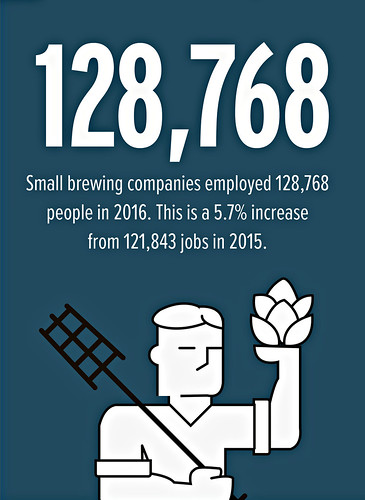
![Portrait of Thelonious Monk, Minton's Playhouse, New York, N.Y., ca. Sept. 1947 [by photographer William P. Gottlieb]](https://blogger.googleusercontent.com/img/b/R29vZ2xl/AVvXsEiM497nNKjrWF7ZO8y1nV2jcZ19ZfQssxiogkwDIO6eStrwRrZl8hJRFEoqLPFDP94ta0RRgt1gTQ6SihhOvtorKSjajTJFPQFTBWJ-XNJJuIGsZvE4RWHqA-n8T-7IG71GQtNLdw/s320/Thelonious_Monk_Mintons_Playhouse_New_York_N.Y._ca._Sept._1947_William_P._Gottlieb_06191-350x350.jpg)
